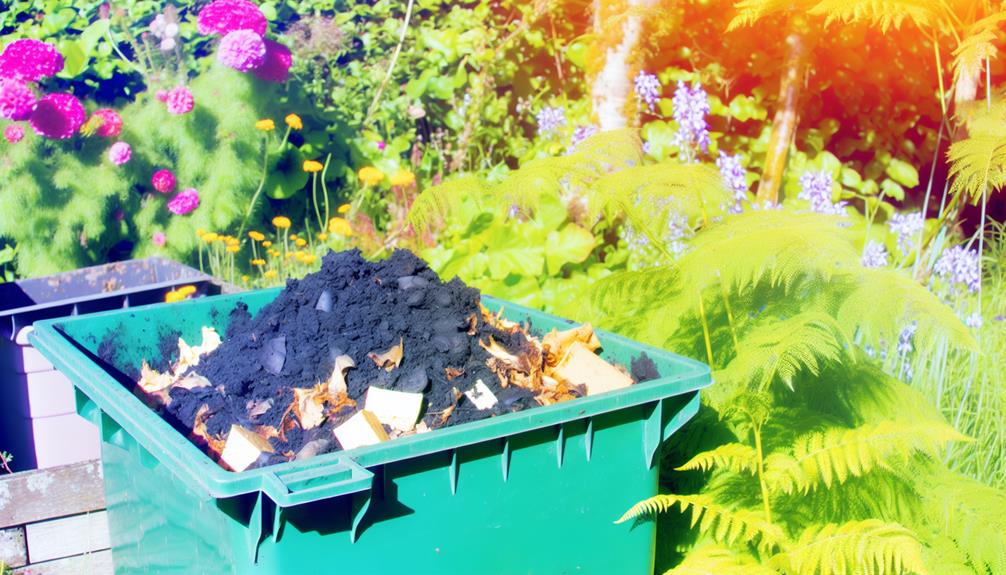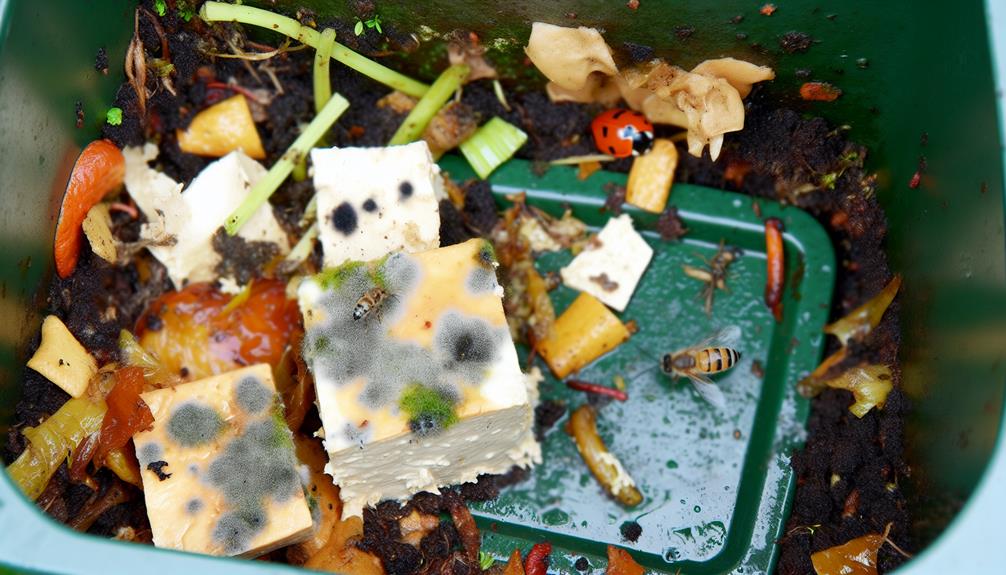

You can absolutely compost tofu, but you need to manage its high protein and moisture content. Start by cutting tofu into small pieces and mix it well with brown materials like dried leaves or cardboard to guarantee a balanced compost mix. Regularly aerate the pile to prevent anaerobic conditions and odors.
Be mindful that tofu can attract pests, so keep your compost bin properly covered. Aiming for a mix of one part green to three parts brown materials helps maintain an efficient decomposition process. For more insights and tips on effective tofu composting, there’s a lot more to discover.
To understand how to compost tofu, you first need to know what it’s made of. Tofu is primarily composed of soybeans, which undergo a detailed soy processing method. This process starts by soaking and grinding soybeans, then boiling the mixture, and finally separating the solid pulp (okara) from the liquid (soy milk). The soy milk is then coagulated using minerals like calcium sulfate to create curds, which are pressed into blocks of tofu.
Tofu’s high protein content is a key aspect of its composition. This protein comes from the soybeans and is retained throughout the soy processing steps. Knowing this is important because the protein content affects how tofu breaks down in your compost. Proteins decompose differently than fibrous plant materials, requiring a balanced compost mix to make sure efficient decomposition.
When you add tofu to your compost, you’re introducing a rich source of nitrogen, thanks to its protein content. This can enhance the composting process when properly balanced with carbon-rich materials like leaves and cardboard.
Understanding these basics of tofu’s composition helps you create a more effective compost, making sure you get the most out of every block you add.
Also Read: Can You Compost Branches?
Composting tofu not only reduces food waste but also enriches your compost with valuable nutrients. By adding tofu to your compost pile, you’re providing a rich source of nitrogen, essential for a balanced compost mix. This helps create a fertile environment for microorganisms, which in turn break down organic matter more efficiently.
Here are three key benefits of composting tofu:
Tofu is high in proteins and minerals. When it decomposes, it releases these nutrients into the compost, enhancing the nutrient content of your soil. This results in healthier plants and better crop yields.
The organic matter from tofu adds bulk to your compost, which improves soil texture and aeration. This is particularly beneficial for heavy clay soils, making them more workable and promoting root growth.
By composting tofu, you’re diverting food waste from landfills, where it would otherwise produce methane, a potent greenhouse gas. This simple act contributes to reducing your carbon footprint and supporting a more sustainable environment.
Incorporating tofu into your composting routine is a practical step towards sustainable living. It not only benefits your garden but also supports the broader goal of environmental stewardship.
Also Read: Can You Compost Bones?
While composting tofu offers multiple benefits, it’s important to be aware of the challenges that can arise in the process. One significant challenge is dealing with tofu’s high protein content. Proteins break down into nitrogen-rich compounds, which can create an imbalance in your compost. Too much nitrogen can lead to a smelly, anaerobic pile, which isn’t ideal for healthy compost.

Additionally, tofu can attract pests. Its protein content can be a magnet for rodents and insects, making it necessary to manage your compost pile carefully. You might need to turn it more frequently or use a compost bin with a lid to deter unwanted visitors.
Another challenge is the environmental footprint associated with soy farming. While tofu is plant-based, the cultivation of soybeans often involves significant pesticide use and deforestation. This means that, although you’re composting, you’re still contributing to the broader environmental issues tied to soy farming.
Lastly, tofu’s high moisture content can make your compost pile too wet. This can lead to a slow decomposition process and unpleasant smells. To combat this, you might need to add more dry, carbon-rich materials like leaves or cardboard.
Also Read: Can You Compost Body Wash?
For successful tofu composting, you should focus on maintaining the right balance of green and brown materials. Tofu, including organic tofu and various tofu varieties, counts as a green material. This means it’s rich in nitrogen and needs to be balanced with brown materials, which are carbon-rich.
To guarantee your compost pile thrives, follow these best practices:
Also Read: Can You Compost Blood?
Many people mistakenly believe tofu can’t be composted due to its high water content. This misconception likely stems from popular myths and misleading claims. However, you can compost tofu effectively by following a few simple steps.

One common myth is that tofu’s water content will disrupt the composting process. In reality, tofu breaks down just like other organic materials. You can manage its water content by balancing it with dry materials like leaves or straw.
Here are some popular misconceptions and the facts to debunk them:
| Misconception | Fact | Tip |
|---|---|---|
| Tofu’s water content makes composting hard | It easily breaks down with other organic matter | Balance with dry materials like leaves or straw |
| Tofu attracts pests more than other food | Properly covered tofu doesn’t attract more pests | Cover with a layer of soil or brown materials |
| Tofu creates a bad smell in compost | Properly managed compost doesn’t smell bad | Guarantee good aeration and balance of greens/browns |
| Tofu can’t add nutrients to compost | Tofu is rich in nutrients beneficial for soil | Mix tofu with diverse compost materials |
Don’t let these misleading claims deter you. By understanding the facts, you can confidently compost tofu and contribute to a healthier, more sustainable environment.
Tofu decomposes in 1-3 months in a compost pile. Make sure you remove any tofu packaging and avoid preservatives. By composting, you’re joining a community that values sustainability and reducing waste. Keep your pile balanced!
Absolutely, you can compost cooked tofu! It adds nutrient benefits to your compost pile. Just remember, the texture changes when cooked, so break it into smaller pieces to help it decompose faster and blend in smoothly.
Yes, pests can be attracted to composting tofu. To manage food waste effectively, practice good pest control by balancing green and brown materials, covering food scraps, and using sealed bins. You’re part of a sustainable community!
You can compost tofu in urban areas, but check urban regulations first. Use secure compost bins to prevent attracting pests. Being mindful of your community’s guidelines helps everyone participate in eco-friendly practices together.
You should aim for a carbon-to-nitrogen ratio of about 30:1. Balance your tofu with carbon sources like leaves or straw to maintain the nitrogen balance. Together, you’ll create a healthy compost that benefits your community garden.
Tofu can be composted effectively if you follow best practices. Make sure you cut it into small pieces to speed up decomposition.
Balance with carbon-rich materials like leaves or paper. Be mindful of potential odors by turning your compost regularly.
Avoid adding large amounts at once to prevent imbalance. By understanding tofu’s composition and challenges, you can successfully integrate it into your composting routine, contributing to a more sustainable lifestyle.
